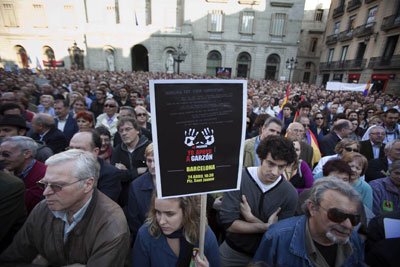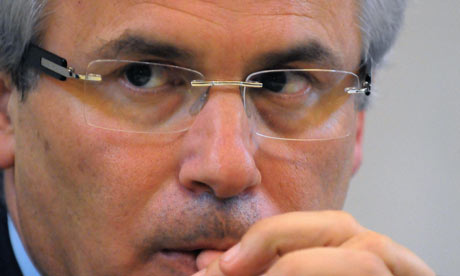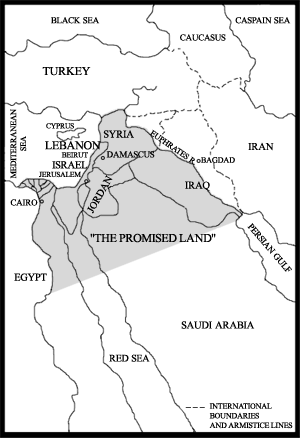 Vente d’armes, soutien logistique, formation... L’intérêt de l’État hébreu pour les pays au sud du Sahara ne se dément pas.
Vente d’armes, soutien logistique, formation... L’intérêt de l’État hébreu pour les pays au sud du Sahara ne se dément pas.Janvier 2009. La scène se déroule dans un somptueux restaurant du bord de mer à Tel-Aviv. Assis nerveusement au coin d’une table, Samuel Sternfeld avise une dernière fois son équipe. Dans quelques heures, cet habile homme d’affaires israélien reconverti en marchand d’armes doit accueillir une délégation officielle de Centrafrique. Bien que l’État hébreu n’entretienne aucun lien diplomatique avec Bangui, tout est organisé comme une visite d’État: accueil des ministres à l’aéroport Ben-Gourion, transport avec chauffeur, rencontre avec des officiers de l’état-major de Tsahal et inspection des principaux sites d’armements israéliens. Chaque étape du voyage est minutieusement planifiée. Soudain, le téléphone de Sternfeld retentit. Des rebelles viennent d’attaquer un détachement des forces centrafricaines dans la région de Ndélé, frontalière du Soudan. Il y a des morts, la visite est annulée. Coup dur pour cet homme d’affaires mandaté par le ministère israélien de la Défense et qui avait financé de sa poche le déplacement de la délégation envoyée par le président François Bozizé. Pour parfaire son « opération séduction », Samuel Sternfeld avait même sollicité le général Amos Gilad, alors négociateur israélien dans les pourparlers avec le Hamas. Gilad était chargé de transmettre l’assentiment officiel de son gouvernement et de mettre en confiance la délégation centrafricaine.
Fini l’eldorado subsaharien ?
Complexe à réaliser sans l’aval de la France, qui a toujours soutenu militairement les troupes de François Bozizé, l’accord avec Israël ne verra finalement jamais le jour. L’enjeu était pourtant de taille pour le président centrafricain. Confronté à diverses rébellions aux frontières nord et est, le général s’était laissé convaincre par Samuel Sternfeld de la nécessité de bâtir une armée plus imposante que sa garde présidentielle composée d’un petit millier d’hommes. Bozizé y voyait aussi l’occasion de se détacher de la pesante tutelle française. Pour ce faire, l’industrie militaire israélienne était prête à tourner à plein régime: drones, blindés, armes légères et vedettes de la marine ont été proposés au régime de Bangui, de même que du matériel d’écoute et de renseignement. Sans grandes ressources financières, le gouvernement centrafricain envisageait en contrepartie de régler l’État hébreu en bois et en diamants.
Inconnu jusqu’ici, cet épisode illustre la nature actuelle des relations entre Israël et les pays d’Afrique subsaharienne, du moins sur le plan sécuritaire. Officieuses, aléatoires, elles obéissent en priorité à une logique d’intérêts politiques et économiques. Comme dans beaucoup d’autres zones géographiques instables, les Israéliens ont su faire valoir leur expérience militaire. « Aujourd’hui, des dizaines de sociétés de sécurité travaillent sur ce continent, toutes dirigées par d’anciens officiers de Tsahal, explique le journaliste d’investigation Ronen Bergman (éditorialiste au Yediot Aharonot). La présence israélienne y est exclusivement privée, c’est un phénomène qui remonte aux années 1970. »
Au lendemain de la guerre de Kippour (1973), lorsque la plupart des pays africains rompent leurs liens avec l’État hébreu, le Mossad décide de se substituer aux diplomates en servant d’interlocuteur auprès des dirigeants africains et des mouvements d’opposition. Isolé sur la scène internationale, Israël cherche avant tout à bénéficier d’appuis au sein de l’ONU. « C’est à ce moment-là que les hommes d’affaires et les marchands d’armes israéliens ont fait irruption en Afrique », raconte l’ancienne députée Naomi Hazan. Au Liberia, au Zaïre, au Togo ou encore au Cameroun, des centaines d’instructeurs israéliens commencent à assurer la formation de gardes présidentielles et d’unités d’élite. À la fin des années 1970, plus d’un tiers des ventes d’armes israéliennes se réalise sur le continent noir. Mais dans certains pays, l’ingérence est parfois lourde d’implications. En Afrique du Sud, l’État hébreu est accusé ouvertement de fermer les yeux sur l’apartheid et d’aider Pretoria a se doter d’armes nucléaires. Tandis que, face à la rébellion érythréenne en Éthiopie, il conditionne son soutien militaire à Addis-Abeba à l’émigration vers Israël des Falashas, les juifs éthiopiens. « L’effondrement de l’URSS a changé la donne, estime Naomi Hazan. D’autres marchés se sont ouverts aux États-Unis, en Inde et en Chine. Ils rapportent chaque année des milliards de dollars à l’industrie militaire israélienne. L’Afrique n’est plus une priorité. »
Nigeria, kenya, éthiopie…
Et pourtant, en septembre 2009, Avigdor Lieberman est venu démentir cette allégation en effectuant une tournée africaine. Officiellement, la visite du chef de la diplomatie israélienne visait à renforcer la coopération sur le plan agricole et proposer des solutions liées à la purification des eaux. « Il ne fait aucun doute que le plus important pour l’Afrique, c’est la lutte contre la pauvreté et la sécheresse, pas les armes », déclarait Haim Dibon, l’un des proches de Lieberman. Ce déplacement officiel cachait néanmoins d’autres ambitions moins avouables. Au sein de la délégation israélienne figurent une équipe du Mossad, des représentants du Sibat, l’organisme en charge des exportations d’armes israéliennes, de même que plusieurs responsables d’industries de défense, comme les sociétés Elbit, Soltam, Silver Shadow et l’Israel Aerospace Industries (IAI).
Les pays visités par Avigdor Lieberman représentent quant à eux un intérêt sécuritaire majeur. Au Nigeria, principal producteur de pétrole en Afrique, en proie à une rébellion dans le Delta et des conflits communautaires dans l’État de Plateau, les ventes d’armes ont rapporté 500 millions de dollars à Israël ces dernières années. Au Kenya, cible par le passé de plusieurs attentats, la coopération antiterroriste a été longuement évoquée. Enfin, l’Éthiopie, partenaire stratégique de l’État hébreu, est positionnée sur la Corne africaine, au carrefour de la mer Rouge, à proximité du Soudan et de l’Égypte, un axe où l’Iran fait régulièrement transiter ses cargaisons d’armes à destination du Hamas et du Hezbollah.
Activités illégales en Guinée
Éditorialiste au quotidien Haaretz, Yossi Melman refuse néanmoins de penser qu’Israël a signé son retour sur le continent noir. Il prône une doctrine plus pragmatique : « En Afrique, là où il y a de l’argent, il y a des armes israéliennes », clame-t-il. Ce spécialiste des questions de défense a récemment révélé les activités de la société de sécurité privée Global CST en Guinée.
En décembre 2008, lorsque le capitaine Moussa Dadis Camara s’autoproclame successeur du défunt président Lansana Conté, il connaît la méfiance qu’éprouve à son égard une partie de la population. N’accordant guère plus de confiance à l’armée guinéenne, dont il est pourtant issu, le chef de la junte décide de s’attacher les services d’un expert en sécurité qui assurera l’encadrement de sa garde prétorienne, les Bérets rouges. Via le diamantaire israélien Beny Steinmetz, qui possède une mine d’exploitation en Guinée, Dadis Camara reçoit Israel Ziv, patron de la société privée Global CST. Ancien commandant des forces spéciales, Ziv possède un profil impressionnant. Connu pour avoir encadré l’armée colombienne lors de la libération d’Ingrid Betancourt, il a également servi de conseiller militaire en Géorgie en 2008, juste avant que n’éclate la guerre en Ossétie du Sud. Dadis et Israel Ziv concluent un accord qui s’élève à 10 millions de dollars. Mais la transaction est illégale: « Ziv a vraisemblablement agi sans le feu vert du ministère israélien de la Défense et a enfreint les règles d’exportation d’armes », explique Yossi Melman. Si le gouvernement israélien a décidé d’ouvrir une enquête, l’affaire est d’autant plus embarrassante que Global CST n’a pas remis en question sa coopération avec Dadis Camara après la répression sanglante de l’opposition, le 28 septembre 2009. « La société Global emploie toujours en Guinée des experts militaires, agricoles, des conseillers politiques et toutes sortes d’ingénieurs civils », affirme Yossi Melman.
Stratégie d’Infiltration
À défaut d’y avoir déterminé une politique claire, les Israéliens ont, semble-t-il, opté pour une stratégie d’infiltration en Afrique. Ainsi, l’aide militaire proposée par des entrepreneurs privés ou publics ne constitue souvent qu’un premier pas. En septembre 2002, cette logique est à l’œuvre lorsque le président ivoirien, Laurent Gbagbo, fait face à une offensive rebelle. Déçu des Français et à la recherche d’un appui militaire, le chef d’État ivoirien se tourne vers son fidèle avocat parisien Sylvain Maier, qui le met en contact avec plusieurs spécialistes israéliens. En quelques semaines, Laurent Gbagbo obtient la livraison d’hélicoptères, de drones tactiques et de matériel d’écoute. Une cinquantaine d’experts israéliens du renseignement opèrent alors à Abidjan pour espionner les communications des rebelles.
Le 6 novembre 2004, cette implication éclate au grand jour lorsque l’aviation progouvernementale bombarde une position française à Bouaké, tuant neuf soldats de l’opération « Licorne ». Paris découvre que des avions sans pilote israéliens ont survolé le secteur peu de temps avant l’attaque. La France demande alors des comptes à l’État hébreu et exige qu’il cesse son assistance militaire à Laurent Gbagbo. Entre-temps, l’homme d’affaires Moshe Rothschild, principal acteur des ventes d’armes à la Côte d’Ivoire, a déjà monté sur place plusieurs entreprises et décroche des projets liés au développement d’infrastructures civiles. À la fin du mois de juillet dernier, c’est Ehoud Olmert en personne qui s’est rendu à Yamoussoukro, pour une visite restée plus que discrète. Organisé par l’ancien ambassadeur israélien en Côte d’Ivoire, Daniel Kedem, le déplacement de l’ex-Premier ministre était lié à des affaires sécuritaires, telles que la mise en place d’un Shin Bet ivoirien pour renforcer la sécurité autour de Gbagbo et surveiller certains éléments hostiles de l’armée ivoirienne. Les Israéliens, en effet, via la société privée Omega, appuient et forment les services ivoiriens, ainsi que la garde présidentielle.
« Les Israéliens sont derrière tous les conflits en Afrique », s’écriait en août 2009 le colonel Kaddafi, en marge d’un sommet de l’Union africaine, à Tripoli. La réalité est autrement plus subtile. Très réactives, habituées aux situations de crise, les entreprises israéliennes sont souvent les premières à proposer leurs services à des pays en guerre: conseil militaire, soutien logistique et armement. Avec seulement neuf ambassades en Afrique, l’État hébreu est contraint de recourir au secteur privé pour exister sur ce continent
http://www.guineeweb.org/







